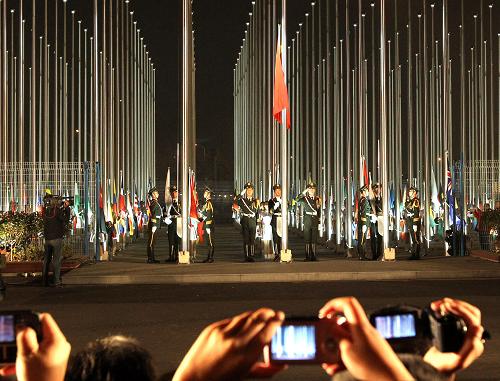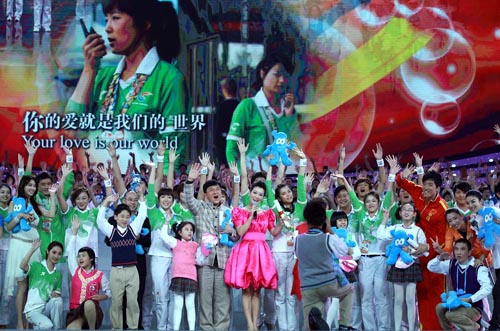China holds closing ceremony for Shanghai World Expo

The 184-day Shanghai World Expo came to the end as a closing ceremony started in Shanghai Sunday evening.
Chinese Premier Wen Jiabao and other dignitaries attended the ceremony.
Chinese Vice Premier Wang Qishan said the Expo has made China and the world come closer together, and a more open, inclusive and culturally advanced China that steadily moves forward will join other countries in the world to usher in an ever brighter future for all.
He said the Expo spirit will be carried forward from generation to generation.
"I am convinced that the vision of 'Better City, Better Life' will become reality," he said.
President of the International Exhibitions Bureau (BIE) Jean-Pierre Lafon said Shanghai World Expo an "astounding success".
"Shanghai shows that with a talented organization, a willing to succeed and an excellent international communication campaign, a World Expo always brings out a true fascination," he said.
The BIE flag was lowered and handed over by Han Zheng, Mayor of Shanghai, and Hong Hao, director general of the Bureau of Shanghai World Expo Coordination to Letizia Moratti, Mayor of Milan, and Giuseppe Sala, CEO of the Milan Expo 2015, via Lofon and BIE Secretary-General Vicente Gonzalez Loscertales.
Wen Jiabao declared the Shanghai World Expo closed, followed by a grand show recalling memories of the event.
Some 155 models from home and abroad with headwear of miniatures of pavilions came onto stage, which instantly draw the audiences back to the scenes at the Expo site.

A video was played to tell a touching story on how a group of volunteers helped some blind children when they were caught in a heavy rain at the Expo site, showing a small part of more than two million volunteers' hard work during the 184 days.
Representatives of Expo participants walked onto stage, sang world famous folk songs together -- the English song "Red River Valley", French song "La Vie en Rose", Russian "Red Berry Blossom", Spanish "Quizas, Quizas, Quizas", Arabian "Breeze Blows Softly", and finally, the Chinese folk song "The Jasmine Flower".
China's top singers, pop stars, and celebrities, including film star Jackie Chan, Olympic champion hurdler Liu Xiang, retired Olympic gymnastics champion Li Ning and pop singer Andy Lau, performed in the show.
Ioannis Drymoussis, Commissioner General of the Greece Pavillion, said the closing gala was "amazing", and he was "so proud" of one of his colleague who could represent Greece to dance with the Chinese artists on the stage.
"We could learn a lot from the Expo, such as how to live in a harmonious way in the world," he said.
Zhu Tingting, a soforemore of the Shanghai Medical University, told Xinhua that her experiences at the Expo would be "the most cherished memory" in her school life.
Born in the 1990s and generally believed as the "spoiled generation", Zhu said she has learnt how to deal with tough situations and to better communicate with people. The Expo spirit would last in her life, she added.
Chen Haikang, a plumber at the Expo Culture Center, said although he had visited few pavillions during the six-month because he had a lot of work to do, he never regrets for that.
"As a Chinese and a Shanghai local, I am proud of my country and my city to hold such a significant event. China is getting more powerful," the 55-year old told Xinhua.
The first of its kind staged in a developing country, the Shanghai Expo attracted 246 participating countries and international organizations and 73 million visitors. Both figures are records in the history of expos, the first of which was held in London in 1851.
On an area of 5.28 square kilometers, the Expo Site has become a global village where people can not only see rare cultural treasures from around the world -- the bronze chariot and horse sculpture from China's Warring States period, the statue of Athena from Greece and French impressionist masterpieces, for example -- but also get a taste of the diversity of the world's cultures through more than 20,000 cultural events.
The gala is eyed in China as another event of national splendor after the 2008 Beijing Olympic Games showcased China's status as an economic and political power to the world.
 0
0 






